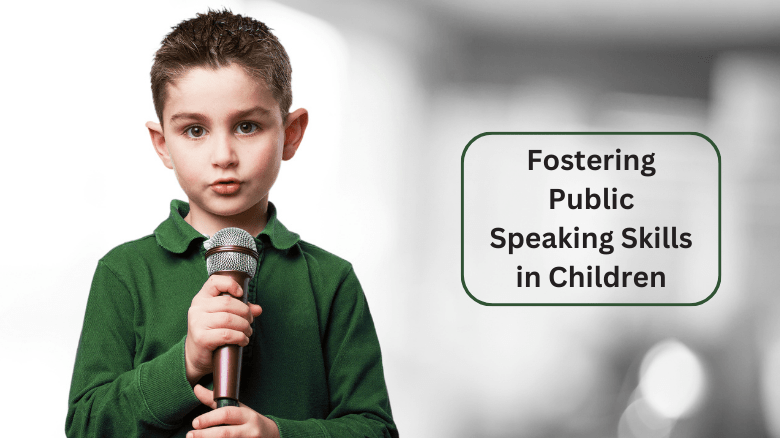Public Speaking, often dubbed as an art, is an invaluable skill that transcends age barriers. Cultivating this skill in children can significantly contribute to their personal growth, confidence, and future success. The importance of nurturing public speaking abilities in young minds cannot be overstated. In a world that thrives on effective communication, equipping children with the public speaking skills from an early age sets a solid foundation for their future endeavors.
Importance of Developing Public Speaking Skills in Children:
1.Confidence Boost:
Public speaking builds confidence in children by encouraging them to express themselves articulately and persuasively. The ability to confidently address an audience instills a sense of self-assuredness that transcends the stage.
2.Communication Prowess:
Effective communication is pivotal in all spheres of life. Public speaking enhances a child’s ability to convey thoughts, ideas, and emotions clearly and convincingly, facilitating better interpersonal relationships.
3.Academic and Professional Success:
As children grow, the demand for public speaking increases. Proficiency in this skill augments academic performance, improves leadership qualities, and lays a strong foundation for professional success.
Strategies to Improve Public Speaking Skills in Children:
1.Encourage Practice:
Like any skill, Practice is key. Encourage children to speak in front of family or friends. Start with informal settings and gradually progress to more formal ones.
2.Provide Constructive Feedback:
Offer gentle and constructive feedback to help children identify areas for improvement without demotivating them. Highlight their strengths and areas needing enhancement.
3.Storytelling and Role-Playing:
Engage children in storytelling or role-playing activities. This fosters creativity, boosts confidence, and helps them become comfortable expressing themselves in different scenarios.
4.Public Speaking Exercises:
Implement exercises that focus on specific public speaking aspects such as voice modulation, body language, and eye contact. This can be done through fun games or exercises tailored to their age group.
5.Join Speaking clubs or Classes:
Encourage participation in speaking clubs or classes designed for children. These platforms offer a structured environment for Learning and practice.
6.Teach structured Preparation:
Teach children how to structure their thoughts by organizing content into an introduction, body, and conclusion. Encourage them to outline their speeches or presentations.
7.Emphasize Body Language:
Help children understand the significance of body language. Teach them about gestures, postures, and eye contact to engage their audience effectively.
8.Foster listening Skills:
Effective communication involves active listening. Encourage children to listen attentively to others, which will aid in formulating better responses during their own speeches.
9.Encourage Authenticity:
Encourage children to be authentic and true to themselves while speaking. Authenticity resonates with an audience and helps children connect better with their listeners.
10.Create Supportive Environments:
Foster an environment where mistakes are seen as opportunities for growth rather than failures. This encourages children to take risks and learn from their experiences.
In today’s dynamic world, the ability to communicate effectively is a prized skill. Nurturing public speaking skills in children from an early age lays the groundwork for their personal and professional growth. By implementing various strategies and providing a supportive environment, parents, educators, and mentors play a pivotal role in shaping confident, articulate, and successful individuals. Encouraging children to speak their minds, providing them with ample opportunities to practice, and guiding them through constructive feedback can transform their ability to communicate and present their ideas. As they navigate through life, these skills will serve as invaluable assets, opening doors to myriad opportunities and enabling them to make a meaningful impact in the world.
Vikas Concept School is known for its holistic approach to education, aiming to not only impart knowledge but also nurture various skills in children. Here are ways in which Vikas Concept School contributes to skill development:
Vikas Concept School employs various strategies and programs specifically tailored to enhance communication and public speaking skills in children:
1.Structured Curriculum:
The school likely integrates communication and public speaking modules into its curriculum. These modules are designed to introduce students to the fundamentals of effective communication, including verbal and non-verbal skills.
2.Workshops and Seminars:
Regular workshops and seminars conducted by experienced speakers and trainers provide students with practical knowledge and techniques to improve their speaking abilities. These sessions might cover topics such as voice modulation, body language, speech structuring, and overcoming stage fright.
3.Debates and Elocution Competitions:
Organizing Debates, elocution contests, and public speaking competitions encourage students to hone their speaking skills in a competitive yet supportive environment. Participation in these events builds confidence and helps students refine their articulation and presentation styles.
4.Toastmaster or Speaking Clubs:
The school might have dedicated speaking clubs or Toastmaster-like programs where students can practice speaking in front of their peers, receive constructive feedback, and improve gradually in a nurturing atmosphere.
5.Interactive Activities:
Interactive activities, such as group discussions, role-plays, storytelling sessions, and impromptu speaking exercises, foster communication skills and the ability to think on one’s feet.
6.Presentation Assignments:
Assignments that require students to prepare and deliver presentations on various topics not only enhance their research skills but also improve their confidence in speaking in front of an audience.
7.Individual Coaching and Mentorship:
Some students might benefit from individual coaching or mentorship. Teachers or external mentors could provide personalized guidance to help students overcome specific challenges and refine their speaking skills.
8.Constructive Feedback:
Teachers likely provide constructive feedback after speeches or presentations, highlighting strengths and areas for improvement. This feedback loop is crucial for students to understand their progress and work on refining their speaking abilities.
9.Integrating Technology:
The school might use technology to aid in improving communication skills. This could involve using video recording tools for self-assessment or incorporating multimedia presentations in projects.
10.Gradual Progression:
The programs are likely designed to ensure a gradual progression in students’ speaking abilities. Starting with smaller presentations and gradually moving towards more complex speeches or debates helps build confidence and skill over time.
By integrating these various approaches, Vikas Concept School aims to provide a comprehensive platform for students to develop effective communication and public speaking skills. Through a combination of structured learning, practical experience, and supportive guidance, students are equipped to express themselves confidently and eloquently in diverse settings.
Public speaking isn’t just about delivering speeches; it’s about empowering children to find their voice and express themselves with clarity, confidence, and conviction—a skill that will serve them throughout their lives. Join Vikas Concept School for your child’s better future. Visit https://www.vikasconcept.com/ and schedule an appointment now!
“Explore Vikas Concept School to pave the way for your child’s brighter future and skill enhancement.”















